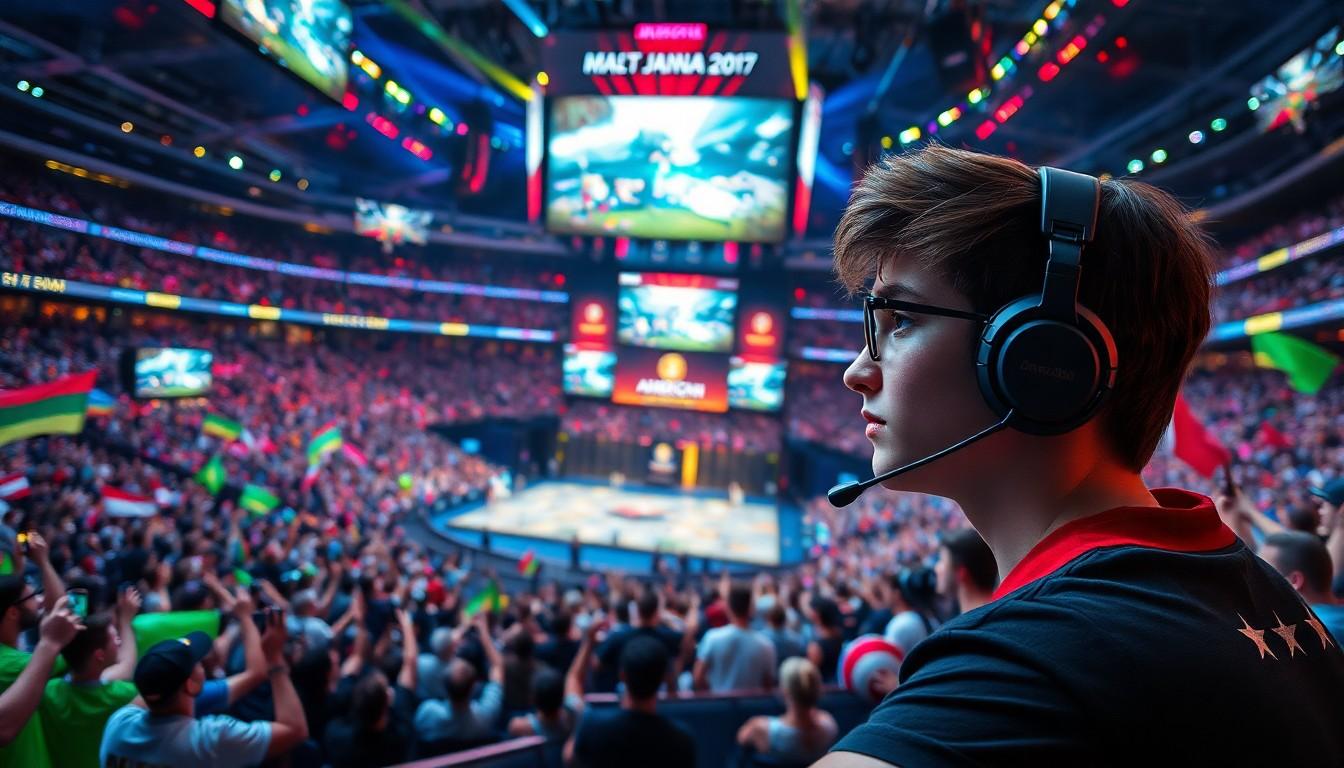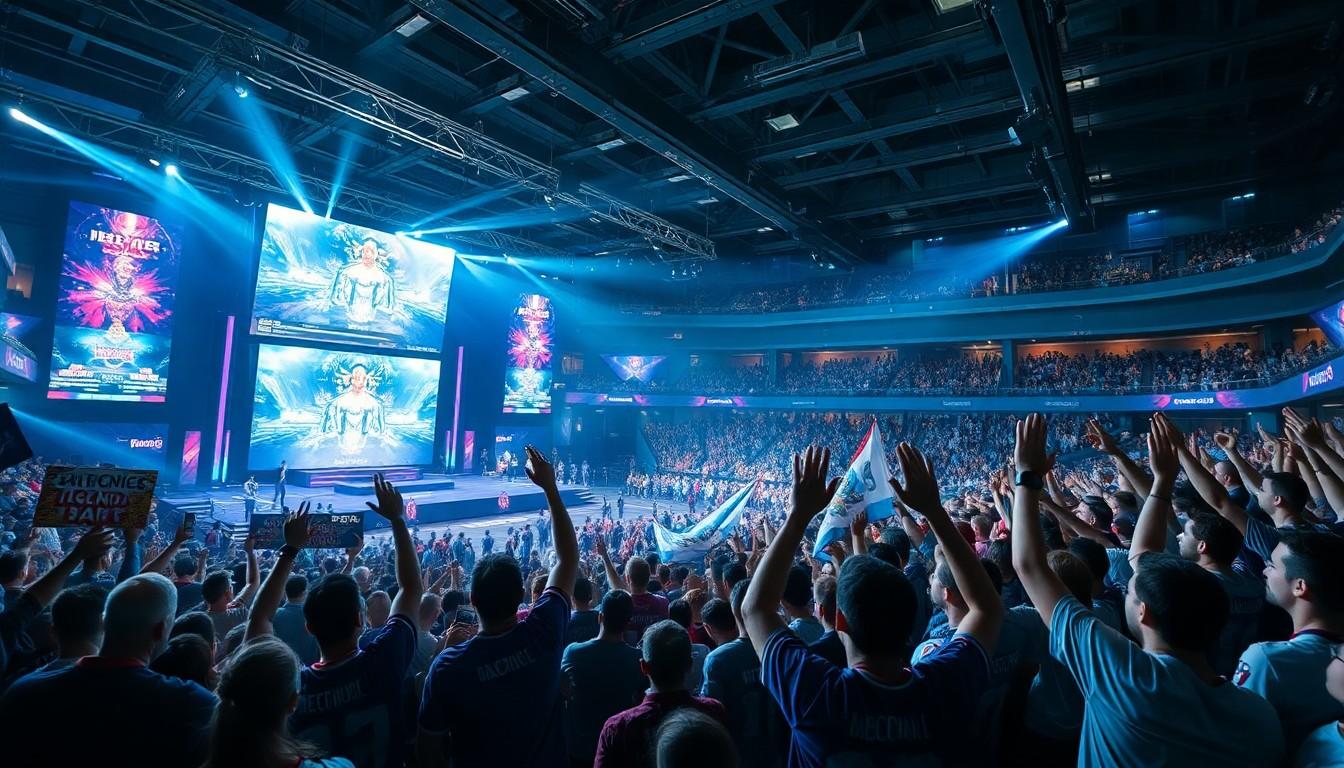Phone:
(701)814-6992
Physical address:
6296 Donnelly Plaza
Ratkeville, Bahamas.

Esports tournaments have exploded in popularity, transforming from basement LAN parties to grand spectacles that fill stadiums. Imagine thousands of fans cheering for their favorite teams while the best players in the world battle it out on screen. But where do these epic showdowns actually take place?
Esports tournaments take place in various venues, ranging from intimate arenas to massive stadiums. Major competitions frequently occur in cities known for their vibrant gaming culture, such as Los Angeles, Korea, and Shanghai. These locations attract thousands of fans eager to witness intense gameplay and cheer for their favorite teams.
A significant number of these events take advantage of large convention centers. Convention centers offer ample space for thousands of attendees, allowing for a mix of gaming stations, merchandise booths, and fan engagement activities. Venues like the Los Angeles Convention Center and the PAX events host numerous esports tournaments throughout the year.
Outdoor stadiums also play a crucial role in the esports landscape. Stadiums, such as the Barclays Center in Brooklyn, New York, and the Staples Center in Los Angeles, provide a spectacular atmosphere for fans and players alike. These venues enhance the experience with large screens displaying live action, creating a communal feel among spectators.
Online platforms supplement physical locations. The rise of digital esports leagues enables tournaments streamed globally. Popular platforms like Twitch and YouTube host live broadcasts, allowing fans to engage with the events from home or on-the-go.
Regional esports tournaments occur in smaller venues, such as local gaming halls and cafes. These gatherings foster community engagement and provide aspiring players the opportunity to compete on a smaller scale. They form the foundation for player development and talent scouting.
Ultimately, the variety of venues used for esports tournaments reflects the broad appeal of competitive gaming. Different locations cater to distinct audiences, ensuring inclusivity within the esports community.

Esports tournaments take place in numerous exciting venues across the globe. Each location offers its unique charm, enhancing the experience for players and fans alike.
North America hosts a variety of major esports tournaments. Cities like Los Angeles attract events such as the Overwatch League and League of Legends Championship Series. The United States also features large venues, including the Staples Center and Madison Square Garden, which accommodate thousands of fans. Convention centers play a significant role, with events like PAX West showcasing competitive gaming. Online streaming platforms, including Twitch, allow audiences to participate even when they’re not physically present, ensuring fans feel involved.
In Europe, a strong competitive scene thrives in major capitals. Berlin and London serve as pivotal locations, hosting tournaments for titles like CS:GO and Dota 2. Iconic venues such as the Wembley Arena create a dynamic atmosphere for fans and players. The ESL One events frequently gather large crowds, showcasing top-tier talent. Additionally, regional competitions occur in smaller cities, fostering local communities. Streaming services, such as YouTube Gaming, further broaden accessibility, allowing fans to follow their favorite teams effortlessly.
Asia stands as a powerhouse for esports tournaments, particularly in countries like South Korea and China. Seoul’s World Cyber Arena frequently hosts prestigious events, attracting international attention. Shanghai also features grand arenas where major competitions occur, like the International. Venues are often equipped with cutting-edge technology, enhancing the viewer experience. Smaller gaming cafes contribute to grassroots tournaments, encouraging budding talent. Online platforms, including Douyu, provide additional avenues for fans to engage with esports, reinforcing the region’s vibrant culture.
Esports tournaments are held both online and offline, each format offering unique experiences. Offline tournaments take place in physical venues, providing a vibrant atmosphere where fans gather to support their favorite teams. Massive venues like the Staples Center and Wembley Arena create memorable experiences, with thousands of attendees cheering for top players.
In contrast, online tournaments utilize platforms such as Twitch and YouTube, streaming events to global audiences. Fans engage from home, enjoying high-quality broadcasts that showcase top-tier gameplay. This format expands accessibility and allows players to compete without geographical limitations.
While offline events create a sense of community, online tournaments foster inclusivity. Small local tournaments, hosted in gaming cafes or community centers, nurture aspiring players while offering fans a chance to connect with their local scene. Event organizers often blend both formats, offering online qualifiers leading to offline finals, maintaining excitement across different platforms.
Notably, major tournaments like the League of Legends World Championship encompass a hybrid approach, inviting teams to compete offline while fans participate online. Gathering physical crowds enhances the atmosphere, yet streaming engages a much broader audience base.
Accessibility plays a key role in the growth of esports, allowing competitors to participate from various locations. Players can showcase their skills in front of live audiences at conventions, yet they can also join from their own homes. The diverse formats of esports tournaments cater to different preferences, contributing significantly to the industry’s rapid expansion and popularity.
Venue selection significantly influences the atmosphere and success of esports tournaments. Large arenas, such as the Staples Center, create an electrifying vibe with their expansive seating and technical setups, accommodating thousands of fans. Smaller venues, like local gaming halls, offer intimacy, fostering community bonds and creating a supportive environment for emerging players.
Specific locations enhance the reputation of tournaments. Cities with strong gaming cultures, including Los Angeles, Seoul, and Berlin, frequently host major events, attracting both players and spectators. These locales not only provide strategic advantages in logistics but also infuse competitions with local enthusiasm, enriching the overall experience.
Technical requirements factor into venue decisions as well. Advanced audiovisual technology elevates the viewing experience for live crowds. Large screens and sound systems engage audiences, while high-speed internet ensures seamless streaming for online viewers. Venues equipped with robust technical capabilities guarantee smooth gameplay and timely broadcasts, which matter greatly to organizers and fans.
The choice of venue impacts sponsorship opportunities and audience demographics. High-profile venues attract corporate sponsors aiming to reach a diverse audience passionate about gaming. Enhanced visibility in renowned locations not only boosts brand recognition but also facilitates investments in the growing esports industry.
Regional tournaments in smaller venues contribute to the grassroots development of esports. These events allow aspiring gamers to showcase their skills and gain exposure, while fostering local gaming communities. The accessibility of such venues encourages participation from a broader range of players, nurturing future talent and expanding the competitive landscape.
Emerging trends in esports tournament locations reflect the industry’s dynamic growth. New cities are gaining attention for hosting major esports events. Cities such as Austin and Toronto rise as potential hotspots, benefiting from vibrant gaming communities and dedicated venues.
In addition to traditional stadiums, unconventional spaces like theme parks and arenas are becoming popular. Venues that offer immersive experiences attract fans looking for more than just gameplay. Unique settings enhance the overall atmosphere, making events memorable for attendees.
Remote locations are also seeing increased interest. Esports tournaments in destination cities offer opportunities for tourism while providing fans a chance to travel. Experiences in these scenic locations combine gaming and vacation, appealing to broader audiences.
Technology continues to influence venue selection significantly. Places equipped with advanced audiovisual setups ensure seamless streaming and engaging experiences for both physical and online audiences. Moreover, high-speed internet remains a non-negotiable requirement for tournaments.
Hybrid formats will likely become standard in esports events. Mixing in-person attendance with online streaming creates a more inclusive experience. Fans unable to attend in person can still participate and engage, driving overall viewership and investment.
Lastly, esports organizations are focusing on community efforts. Smaller regional events foster grassroots movements and local talents, emphasizing diversity and inclusion. Venue choices that cater to community engagement create nurturing environments for aspiring players.
Overall, the future of esports tournament locations will depend on innovation, accessibility, and community engagement. As the landscape evolves, the embrace of diverse venues will reshape how fans experience competitive gaming.
Esports tournaments are transforming the gaming landscape by bringing together players and fans in exciting venues worldwide. From iconic stadiums to local gaming cafes these events create a unique atmosphere that fosters community and competition. As cities like Los Angeles Seoul and Berlin continue to embrace esports the future looks bright for both large-scale and regional tournaments.
The blend of offline excitement and online accessibility ensures that fans can engage with their favorite games regardless of location. With emerging hotspots and innovative venue choices on the horizon the esports community is set to grow even further. This evolution not only enhances the spectator experience but also nurtures local talent creating a vibrant ecosystem for gamers everywhere.